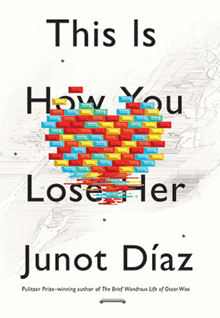The title of Junot Díaz’s new story collection comes from a tale in which Yunior, the book’s principal character, cheats on his girlfriend, Alma. When Alma discovers an incriminating journal entry, she confronts him. But Yunior, “instead of copping to it like a man,” lamely claims the entry is part of a novel he is drafting.

By Junot Díaz,
professor of writing
Riverhead, 2012, $26.95
“This is how you lose her,” Díaz writes, abruptly concluding the story.
Indeed, throughout This Is How You Lose Her, published in September, Yunior cannot stop searching for his ideal woman, and cannot stay faithful to the companions he does find.
“I always thought this was a book about … a young man and [how] his vision of the women in his life, and experiences with them, have prevented him from achieving what he most dreams of, which is an intimate relationship with a woman,” says Díaz, a professor in MIT’s Program in Writing and Humanistic Studies.
Using percussive prose—the New York Times Book Review called his style “electrifying”—Díaz’s stories provide a vivid, detailed account of Yunior’s romantic activities and desires. “Ninety-nine percent of representations of men in popular literature, television, [and] movies are fundamentally sanitized,” Díaz says. He deliberately takes the opposite approach.
That realism, he claims, is why his work connects with what he calls a predominantly female audience. “I wouldn’t have a career if it weren’t for women,” he says, adding that the book is “an attempt to open up a conversation about masculinity.”
It took Díaz “years and years” to produce the new book, his third, but now he is seeing a grand payoff for his efforts. In the fall, he received a MacArthur Foundation “genius grant,” worth $500,000; This Is How You Lose Her was also nominated for a National Book Award for fiction.
Díaz, 44, is accustomed to praise: his first book, the 1996 story collection Drown, gained critical acclaim, and his second, The Brief Wondrous Life of Oscar Wao, won the Pulitzer Prize. Still, he says he was virtually “speechless for two days” after winning the MacArthur grant. “I’m the immigrant kid of a parent who was an undocumented worker,” he says; as a child he came with his family from the Dominican Republic to New Jersey. “This stands as encouragement for the general [Latino] community.”
Like Díaz, the character of Yunior (who also appeared in Drown) is a Dominican immigrant to New Jersey who attends Rutgers and winds up, in This Is How You Lose Her, teaching writing in Cambridge. But Díaz’s stories are not wholly autobiographical; he says he enjoys the uncertainty readers may have about which elements are real and feels comfortable letting them draw their own conclusions about his literary alter ego.
“I understand [Yunior’s] character well, I can produce him, but I don’t see him fully,” he says. “That’s part of this game: I’m behind the screen throwing these shadows, but the only person who knows that this is working or not is the reader.”
Recent Books from the MIT community
Great Inventions That Changed the World
By James Wei, SM ’54, ScD ’55, former Chemical Engineering Department head, John Wiley, 2012, $49.95
Planning Ideas That Matter: Livability, Territoriality, Governance, and Reflective Practice
Edited by Bishwapriya Sanyal and Lawrence J. Vale, SM ’88, professors of urban studies and planning, and Christina D. Rosan, MCP ’02, PhD ’07, MIT Press, 2012, $27
Reforming the Unreformable: Lessons from Nigeria
By Ngozi Okonjo-Iweala, MCP ’78, PhD ’81, MIT Press, 2012, $24.95
The Crisis of Crowding: Quant Copycats, Ugly Models, and the New Crash Normal
By Ludwig B. Chincarini, PhD ’95, Bloomberg.Wiley, 2012, $40
Exit Zero: Family and Class in Postindustrial Chicago
By Christine Walley, University of Chicago Press, 2013, $85 cloth / $27.50 paper
Sustainable Energy: Choosing Among Options (second edition)
By Jefferson Tester, PhD ’71; Elisabeth Drake ’58, ScD ’66; Michael Driscoll, NUE ’64, ScD ’66, professor emeritus of nuclear science and engineering; Michael Golay, professor of nuclear science and engineering; and William Peters, PhD ’72, executive director of the Institute for Soldier Nanotechnologies at MIT , MIT Press, 2012, $90
Building Mobile Experiences
By Frank Bentley ’02, MNG ’03, and Edward Barrett, senior lecturer, Program in Writing and Humanistic Studies , MIT Press, 2012, $30
Please submit titles of books and papers published in 2012 and 2013 to be considered for this column.
Contact MIT News
E-mail mitnews@technologyreview.com, Write MIT News, One Main Street, 13th Floor, Cambridge, MA 02142, Fax 617-475-8043
Keep Reading
Most Popular
Large language models can do jaw-dropping things. But nobody knows exactly why.
And that's a problem. Figuring it out is one of the biggest scientific puzzles of our time and a crucial step towards controlling more powerful future models.
The problem with plug-in hybrids? Their drivers.
Plug-in hybrids are often sold as a transition to EVs, but new data from Europe shows we’re still underestimating the emissions they produce.
Google DeepMind’s new generative model makes Super Mario–like games from scratch
Genie learns how to control games by watching hours and hours of video. It could help train next-gen robots too.
How scientists traced a mysterious covid case back to six toilets
When wastewater surveillance turns into a hunt for a single infected individual, the ethics get tricky.
Stay connected
Get the latest updates from
MIT Technology Review
Discover special offers, top stories, upcoming events, and more.